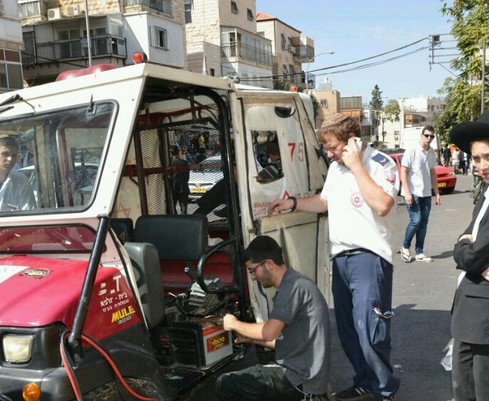Stuck at Home or on the Road? Meet the Touching Organization "Yedidim"
A group of friends transformed their 'news sharing' group into a support network for those stranded, thus giving birth to Yedidim, an on-road first aid organization. An interview with the national volunteer coordinator, Rafael Barchatz. Contact details included for those interested.
 Yedidim volunteers in action
Yedidim volunteers in actionThe year was 2006, during the Second Lebanon War. A group of individuals from the heart of the Haredi cities roamed with their kosher MiRS devices, sharing neues (news - translation) on all topics.
Traveling the roads became daunting, especially in risky areas, and within a week, group members encountered two incidents requiring assistance. Both incidents occurred on the 443 highway, en route to Modi'in Illit. 'I'm stranded with a flat tire and afraid to leave the car,' one member reported to the group. A friend, hearing the report, replied that he was heading to the area shortly and would stop to offer both physical and mental support. In another instance, a member ran out of fuel and could not reach the closest station, even at the Shilat Junction. Assistance was promptly offered without hesitation, as a volunteer made a special effort to help.
These two close occurrences inspired Meir Weiner, a resident of Modi'in Illit and the group's founder, to conceive a unique idea of creating a support group for road-stranded people — "First Aid on the Road."
A makeshift Yedidim communications center was thus born, operated by the same neues group, renaming itself Yedidim. A member with a printing business volunteered to print stickers, a logo, and anything needed for publicity. Weiner offered his catchy and memorable number, obtaining a new one for himself, and his wife received calls in their living room, forwarding them to group members. The word spread quickly, and within weeks the organization boasted 200 volunteers. Here is my disclosure: I am married to a volunteer who joined the organization in its infancy.

Loading the Bike on the Car and Hosting the Rider for Shabbat
From 2006 to 2008, the organization mainly served large cities: Jerusalem, Bnei Brak, Elad, Kiryat Sefer, with more volunteers. Initially, Weiner purchased equipment like jumper cables, flat spray, air filler kits, and car-opening kits out of personal kindness. 'Later on, donations started coming in,' says Rafael Barchatz, the national volunteer coordinator, 'but it wasn't enough to equip the growing number of volunteers, with Hashem's help.'
Apparently, many people find themselves stranded, and the volunteer assistance idea truly caught on. 'Sometimes it even helped save lives or prevent Shabbat desecration,' Barchatz notes. 'We got a call from a motorcyclist on his way to Jerusalem who stalled near Beit Shemesh due to fuel, or so he thought. Two volunteers from Beit Shemesh went to him with gas but found the motorcycle was the issue. As Shabbat's entry approached with only 20 minutes left, they didn't hesitate to load the bike onto a car and bring the rider to Beit Shemesh, hosting him throughout Shabbat respectfully and assisting until their bike was fixed.'
In 2009, the organization slowed due to many leaving MiRS for competitors offering better prices. Despite the decline, the organization continued to operate vigorously within its means. 'This organization started with the idea of providing on-road service, and the fact that people made special efforts to assist wasn't taken for granted,' explains Barchatz. 'Though responses weren't always immediate, we always prioritized crucial cases.'
'Come Search for the Black Lizard at Home'
While Barchatz explains the limitations in some cases, curiosity compels me to inquire about unique requests they might receive. It seems people often test the organization's limits by requesting unrelated assistance, just trying their luck.
'Here's a message from two weeks ago,' Barchatz shows me: '
'At 10:21 a.m., No. 6, Content: First name and last name (removed for privacy - translation) reports a giant black lizard and is scared since there's a baby at home. Phone...', ''She insisted we search for the lizard at her house over the phone, confessing fear,' the volunteer manager recounts. 'I couldn't help but pity the anxious woman, yet volunteers aren't always available to hunt lizards at homes...In another instance, a Jerusalem family visiting Ganey Hader in Petah Tikva realized they forgot vital medication for a family member, unavailable nearby. After contacting Yedidim, who issued a formal notice, an Elad resident volunteered to deliver the required medicine.
Do People Differentiate Between Help and Exploitation?
'Over the phone, it's hard to discern exploitation intentions, but we trust people won't cause harm. Most requests involve genuine need. For example, Barchatz shares an incident where a volunteer suffered from helping. 'Someone needed help with a flat tire. A nearby volunteer reached the address, parked in a building's garage, but heard a call from a window. 'Oh, you're from Yedidim?' I'm upstairs. Let me know when you're done changing the tire.' The volunteer felt deeply hurt. If you're disabled or have any problem, we'll gladly help, but don't exploit us. We share this for public awareness and learning. Usually, volunteers meet grateful individuals eager to pay for the help.'
Yisrael Elmasi, CEO of Yedidim, Honored with Torch Lighting (Year 5780). Watch
The WhatsApp Era: 40 Volunteer Groups Overnight
Today, around 1,200 volunteers are registered with 'Yedidim'; 850 are active. Besides support in Bnei Brak, El'ad, Jerusalem, Ashdod, Netanya, Modi'in Illit, Kfar Chabad, Bat Yam, Tsfat, and Meron, partnerships were formed in the Golan Heights with 'Megillot' Jeep unit, collaborating closely. Also, in Judea and Samaria, collaborating with regional councils, alert squads, and the army. About 160 volunteers under 'Yedidim in Samaria' can also be found on the app.
Aside from volunteering, they have families and jobs, which shouldn't be forgotten. After a year-and-a-half slowdown, with WhatsApp's emergence, the organization picked up speed quickly. Group after group opened, with even those with kosher devices joining through permissible apps, making operations smoother and accelerating activities. The organization was divided into departments. The Communications Department, led by volunteer Moshe Dahan from Hashmonaim, handles all media and phone inquiries. The Volunteer Department is headed by Barchatz.
Motti Meivsky, the devoted spokesperson from the MiRS era, appointed communication coordinators responsible for managing social networks: Shalom Eldad and Moshe Mizrahi.
'We eventually realized it wasn't right to keep these acts of kindness only among ourselves. The entire nation should know and join us,' states Barchatz. 'So, we started advertising on radio, the internet, and everywhere Israelites generally go—not just within the sector. Children lock themselves in cars everywhere, people get stranded in cities, and everyone needs some form of assistance without race, religion, or gender differences.'
Aren't There Conflicts with Older Organizations?
'We're not out to impinge on anyone's work,' assures Barchatz. 'We're here to support those in need, whether it's contacting us in panic over an unresponsive elderly parent or a trapped child in a car or elevator. Our focus is on initial roadside assistance, not life-threatening incidents. We have rescued phones or valuable jewelry from drain holes that took municipalities long to address. Today, we collaborate with rescue, fire, police, army organizations, assist in searches, rescues, and all charity-related emergencies.'
Who Can Join as Yedidim?
'People call and ask me what knowledge or requirements they need to volunteer,' shares Barchatz. 'I always say they need a willingness and a vehicle, and sometimes a vehicle isn't necessary. Ending a workday, encountering a case on the road, exhausted and eager for home rest—would you help or not? If you have the will, motivation, and spirit of unity, you're a volunteer in full standing.'
Following extensive publicity, women also contacted the organization seeking to contribute, assisting in cities like Petah Tikva and Tel Aviv. 'Usually, tasks aren't complicated,' Barchatz explains. 'It involves handling a spray or cables, which is doable. Anyone wishing to volunteer is welcome.'
Where Does Funding Come From? Naturally, they operate as a non-profit organization, living off donations or personal expenses. 'Now, each volunteer agreed to pay 400 NIS for a breakthrough kit, and the organization covered the remaining costs,' Barchatz shares. As more people donate and volunteer, we can offer broader services. But sometimes, people in distress, sparked by motivation and desire to help, make promises, take a contribution number, but forget once they're no longer in the moment. Not with ill intent, just human nature and life's pace. We keep acting in all ways. Whoever aids enjoys their fortune, and we'll always remain 'Yedidim' to all.'
National Hotline 053-3131310 - 24 hours a day, except Shabbat and holidays.
Volunteer Hotline and Questions 053-3199357

